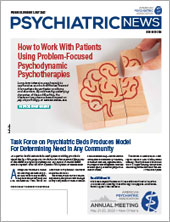Structural racism causes persistent inequities in medical and psychiatric care that damage the health of people of color. It also profoundly influences research methodology, editorial review, and the findings that are ultimately published by journals.
Acknowledging this truth is especially important for a journal such as Psychiatric Services, whose focus is inseparable from issues of race, culture, and ethnicity. These issues also affect who runs the journal, who submits and reviews, what topics are emphasized, how the role of racism and ethnoracial categories are conceptualized and included (or ignored) in analyses and discussions, and what policy and services are recommended.
Over the past year and a half, we have taken multiple steps to review the impact of structural racism on the journal and institute changes to address it, including appointment of a 12-member Structural Racism Advisory Group, co-led by Jessica Isom, M.D., M.P.H., an early-career community psychiatrist and clinical instructor at Yale University. The group consists of clinicians, researchers, and people with lived experience to advise the journal.
Now we are embarking on the next phase of this process, which directly involves the submission and peer-review procedures. With the crucial help of Roberto Lewis-Fernandez, M.D., a professor of clinical psychiatry at Columbia University and director of the New York State Office of Mental Health’s Center of Excellence for Cultural Competence, we are piloting the use of a 16-item checklist for all submitted regular articles and brief reports in the next six months. The checklist, modified from one developed in 2013 by the Cultural Committee of the Group for the Advancement of Psychiatry (GAP), can be used by authors, reviewers, and editors to assess the scope and rigor of attention to race, ethnicity, and culture (REC) in a research article.
We want to emphasize that this is a pilot project; the checklist and its application to submitted papers will require modification and improvement over time. We hope that many authors and reviewers will take us up on our invitation to give feedback about the checklist and its use.
Below are the 16 items on the checklist.
General Use of Terms
•
Does the manuscript include one or more terms related to race/racialization, ethnicity, and culture in the article text?
•
Does the manuscript include one or more REC-related terms in the title, abstract, or keywords?
•
Does the manuscript provide a definition of the REC-related term(s) used in the article?
Introduction Section/Rationale
•
Does the manuscript use REC-related terms in presenting the background literature, study question, or study design?
Methods Section/Study Sample
•
Does the manuscript include REC-related factors in the sampling procedure?
•
Does the manuscript describe the sample in terms of REC characteristics?
•
Does the manuscript describe the method used to assess REC characteristics of participants?
Methods Section/Data Collection (Interpersonal Communication)
•
Does the manuscript specify the language proficiency of participants?
•
Does the manuscript discuss the relevance of the language characteristics of interviewers and participants?
•
Does the manuscript discuss the relevance of the REC characteristics of interviewers and participants?
Methods Section/Instrument Translation and Psychometrics
•
Does the manuscript address the language match between participants and instruments?
•
Does the manuscript describe the psychometric adequacy of the instruments for all REC-defined groups in the study?
Results Section/Data Analysis
•
Does the manuscript report the associations between REC-related factors and study outcome(s)?
•
Does the manuscript include REC-related factors in the data analysis?
Discussion and Conclusions Sections
•
Does the manuscript discuss REC factors in data interpretation?
•
Does the manuscript discuss study limitations in assessing and addressing REC issues?
A fuller description of the checklist and of the steps taken by our journal to address REC issues appears in an
editorial by me and my colleagues.
Mental health services research is crucial because it guides policymaking and health system changes that ultimately affect patient care and its accessibility. But the accuracy and reliability of our findings depend on the rigor with which authors and editors consider all of the possible variables that affect mental health outcomes and shape service delivery for the breadth of populations we serve. That, ultimately, is why the steps we are taking at Psychiatric Services are so important to APA members and readers of our journal—these steps, including the REC checklist, will improve our ability to publish high-quality research that promotes health equity and helps eliminate the impact of structural racism in mental health services.
We welcome your input and suggestions for additional ways to achieve our goal. Comments may be emailed to
[email protected](subject line: REC Checklist). ■

